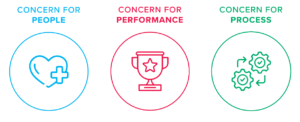Coaching is an essential tool when it comes to supporting behaviour change – and if you’re looking to make any change for the betterment of your business and team, then obviously there’s a need to change some stuff people do.
It’s well recognised that a training event may influence new behaviour in the region of 10% – but when new learnings are embedded through follow up coaching, the figure jumps upward over 80%.
Coaching in the workplace generally falls to the managers, whose responsibility is to get results through their teams. And it’s an effective skill for managers to have. Both the Blanchard programs and Core Strengths Platform elevate the need for not just the skillset – but the mind set needed to sustain new behaviours.
When we consider managers as coach, they need more than just the coaching skills gained at a workshop; they need the mindset to coach.
A manager needs to understand how a coaching relationship will benefit them if they are to create an effective coaching culture and to feel comfortable having coaching conversations. Coaching conversations are critical to move team members through the development stages, that they can make a fuller contribution. Coaching is an enabler for managers to give feedback, an often fraught conversation that many avoid.
Create a trust-based coaching relationship
The Core Strengths platform is in it’s element when the objective is to build better relationships. When relationships are built on trust managers and their direct reports can be their true selves. They sense that you are interested in and focused on their wellbeing – not on business “results” at the expense of the relationship.
When teams take the SDI 2.0 assessment, they get a sense of purpose within three primary motivators:

When you take the SDI 2.0 assessment, you get a full portrait of how all three blend in your personality. Self awareness makes us better at coaching. We become aware of our own motivations and how they shape our perspective and we become aware that others have different primary motivators for ours.
Understanding the person we’re coaching enables us to speak in a way that taps into their motivation. The reality is, each direct report is different. They are motivated by different things and have different values and priorities. But when we know their values and motivations we can coach them to meet objectives and drive results in a way that also allows for their own personal growth.
The cost of poor manager coaching
Successful coaching managers find goals become mutually agreeable; managers are able to allow for mutual trust while still aligning on goals and objectives. Gaining buy-in based on personal motivators and trusting relationships makes for a more sustainable behaviour change. Coaching managers that fail likely resort to too much directing, meaning behaviour change only happens because they’re told to, and they will revert back to old behaviours at the soonest opportunity.
When growth opportunities cease to exist, employees look elsewhere. Motivation drops because there is no link to their personal motivations and values. ‘What’ they do is not connected to the ‘why’.